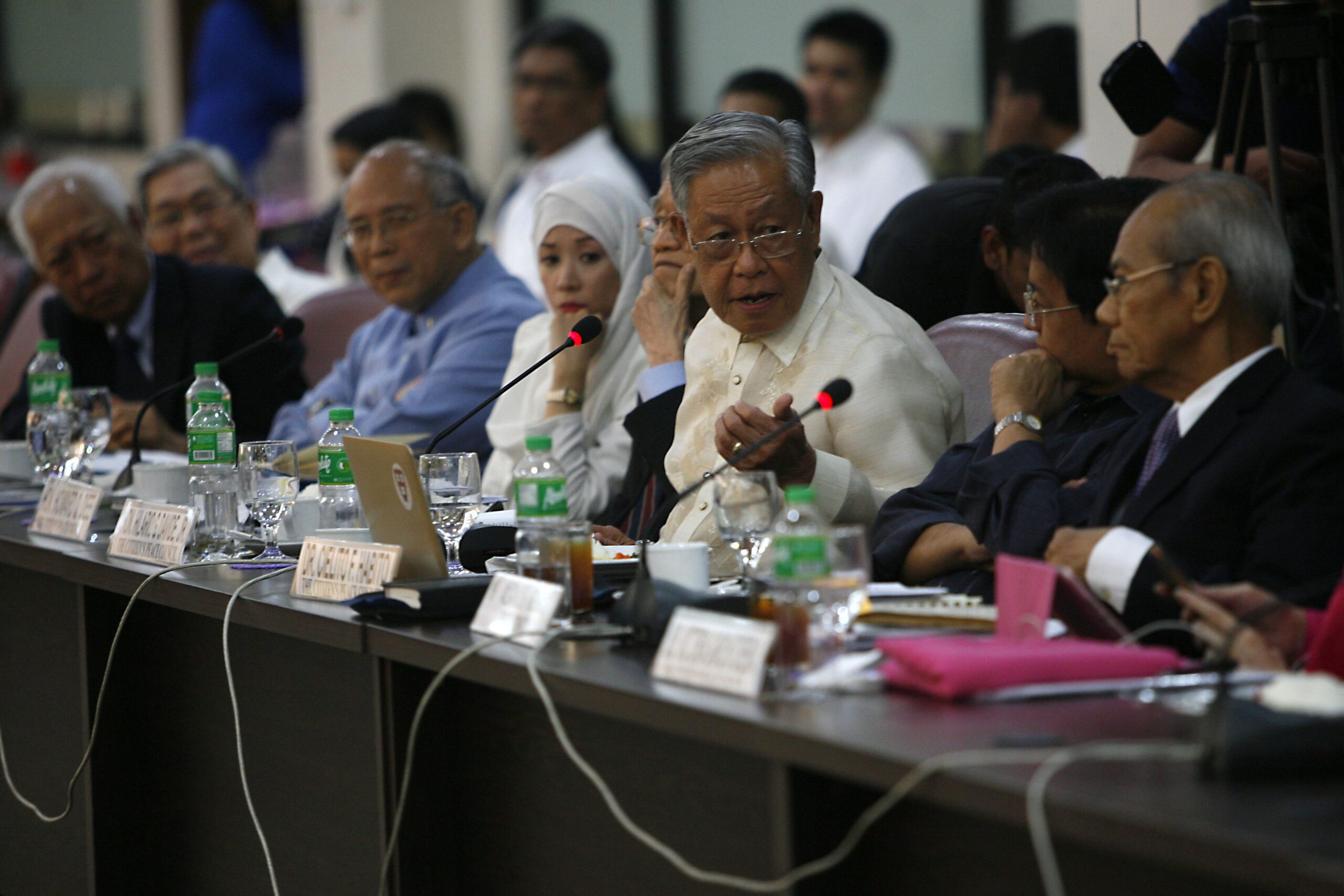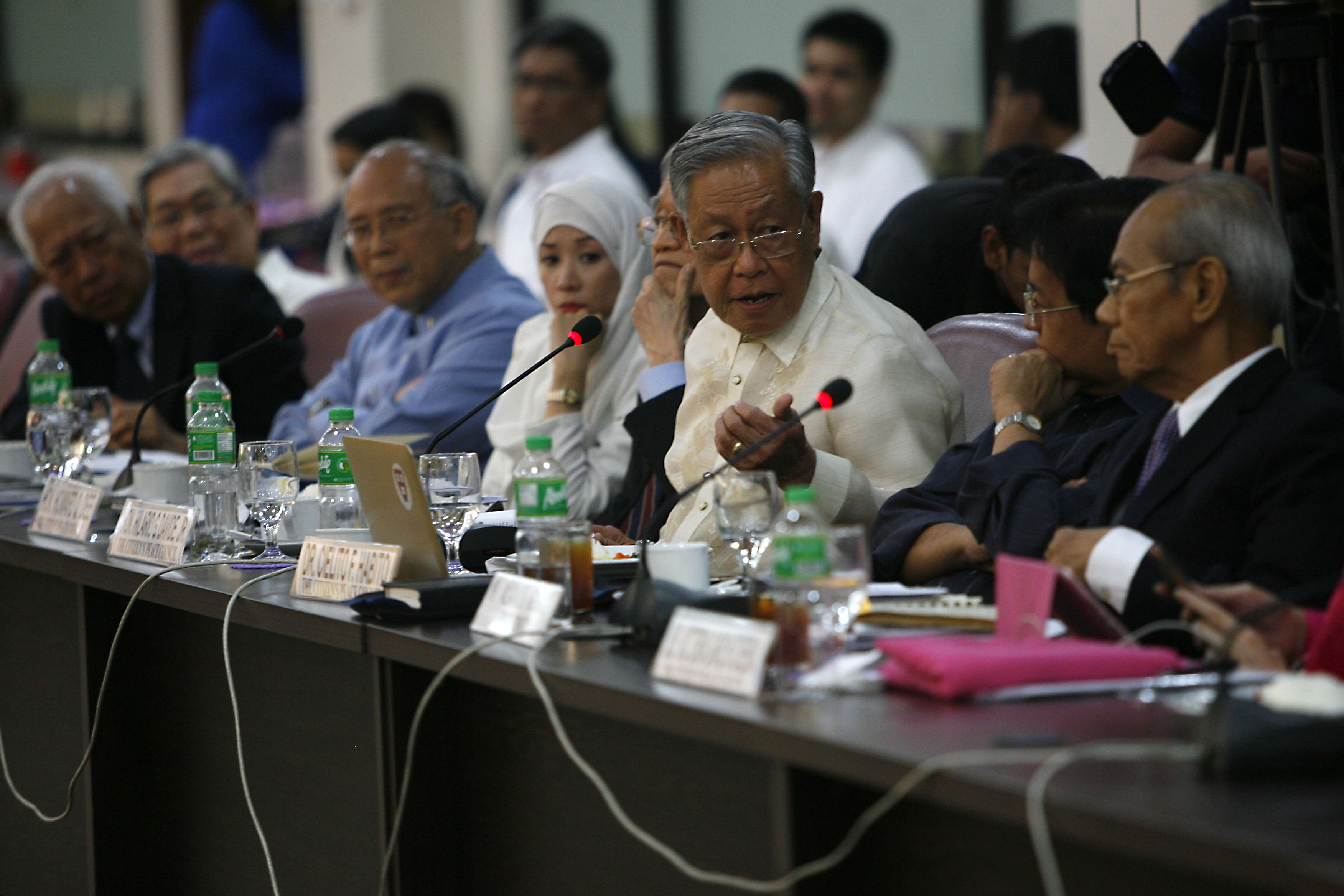SUMMARY
This is AI generated summarization, which may have errors. For context, always refer to the full article.


MANILA, Philippines (UPDATED) – After conducting a review of the proposed Bangsamoro Basic Law (BBL), the Malacañang-convened Peace Council announced on Monday, April 27, its position that the measure does not violate the Constitution.
The council, through former Chief Justice Hilario Davide Jr, said the proposed law is “overwhelmingly acceptable,” save for some provisions that it recommended for review.
At the final public hearing of the House of Representatives ad hoc committee discussing the bill, the Peace Council submitted its recommendations on the BBL after weeks-long discussions.
“Overall, we agreed that the BBL is overwhelmingly acceptable and deserves the support of all Filipinos. On the few provisions that needed some refinement, we offered recommendations,” a statement from the Peace Council said.
However, Cagayan de Oro Representative Rufus Rodriguez, chair of the House ad hoc committee on the BBL, said he was unconvinced that provisions on constitutional commissions, and the police and military setup in the region should not be deleted.
The Peace Council was convened after the Mamasapano clash caused a political fallout for the proposed law that would put the Moro Islamic Liberation Front (MILF) in charge of the transition to a new, more powerful region in Muslim Mindanao.
One of the provisions that the council recommended to be removed is the so-called opt-in provision that allows areas not included in the Bangsamoro core territory to join the plebiscite with a petition signed by 10% of voters.
This is one of the 8 provisions that the House of Representatives has said it is set to delete from the law for allegedly being a recipe for instability.
Davide said the the core Bangsamoro territory “should not be allowed to increase indefinitely.”
Here are the 5 key findings of the Peace Council in connection with the constitutionality of the measure:
1. The BBL does not vest statehood to the Bangsamoro Government. The provisions on “people,” “territory,” and “self-determination” are not vestiges of a separate state, but are consistent with the constitutionally-mandated creation of autonomous regions.
2. The Bangsamoro Government, as constituted in the BBL, is compliant with the requirements of the Constitution. The government, with an executive department and legislative assembly, has officers that are elective and representative of the constituent political units.
3. The inter-governmental relation between the National Government and the Bangsamoro Government is consistent with the allocation of powers mandated by the Constitution. The defined relationship between the National Government and the Bangsamoro Government embodies the essence of genuine autonomy, based on principles of subsidiarity and solidarity.
4. The Supreme Court and the Constitutional Bodies continue to maintain the powers that are given them under the Constitution. There is neither substitution nor diminution of powers intended or effected by the creation of the Bangsamoro human rights, auditing, civil service, and electoral offices.
5. The plebiscite requirement in the BBL adheres to the provision of the Constitution on the process for creation of the autonomous region.
Read the statement of the council on the constitutionality, powers of government of the BBL below:
Peace Council Statement on the BBL
House panel chair unconvinced
In a chance interview with reporters on Monday, Rodriguez said he is still of the opinion that the proposal to create autonomous bodies of the Commission on Audit, Civil Service Commission, Commission on Elections, and the Commission on Human Rights should be cancelled.
While Davide said that the BBL does not take away from the powers already given to the constitutional bodies, Rodriguez, a lawyer, said his position remains that it is outside the jurisdiction of Congress to create changes within these commissions.
Instead of Congress creating autonomous bodies in the Bangsamoro, he said the COA, for instance, should move to strengthen its regional branch.
Rodriguez also remained adamant about deleting provisions pertaining to operation of Philippine National Police and the Armed Forces of the Philippines.
He, however, said he is willing to take a second look at the measure following the Peace Council’s recommendations.
The ad hoc committee on the Bangsamoro is set to hold an executive meeting after Monday’s public hearing.
Rodriguez, however, said members will no longer discuss proposals but rather just conduct a “rundown” of the proposed amendments in the law.
Executive Summary – Peace Council report
– Rappler.com
Add a comment
How does this make you feel?
There are no comments yet. Add your comment to start the conversation.